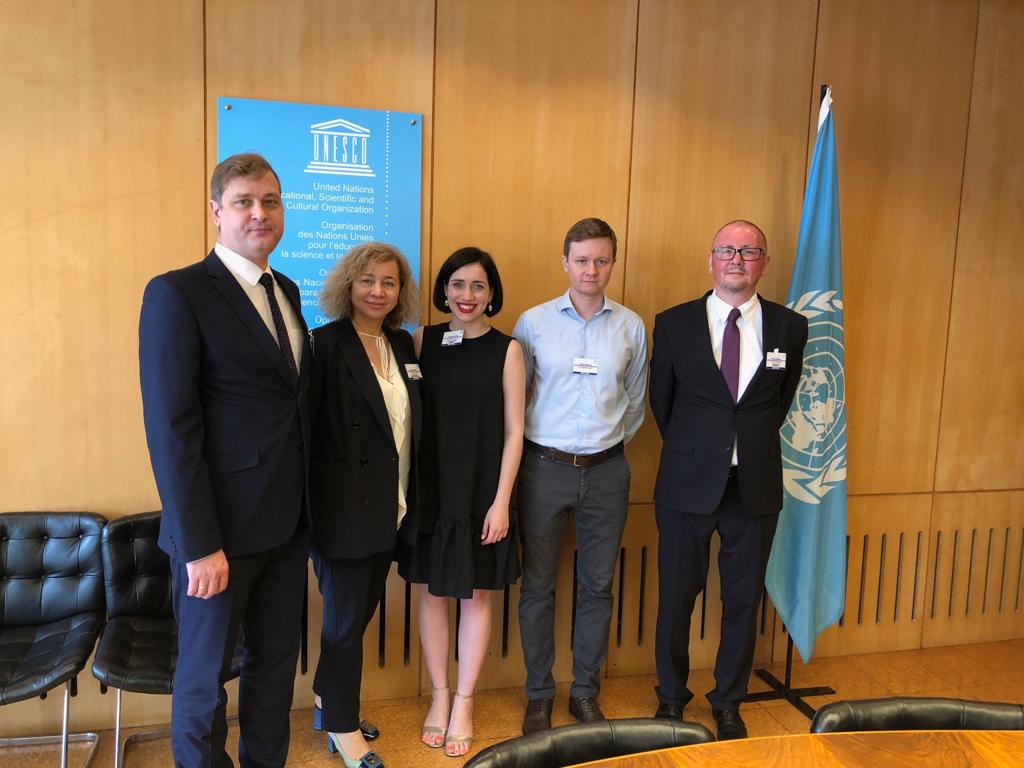
SUM Experts Expand HDI with New Digital Development Indicators
As a holder of special guest-country status, Russia held a panel discussion titled On the Way to the Society of Digital Equality: Challenges and Perspectives at the UNESCO Headquarters today. The session was incorporated into the 15th Edition of the World Conference on Intellectual Capital for Communities titled Artificial Intelligence and the Next Generation of Competencies: How Digital — and Artificial Intelligence — Will Impact Jobs and Professional Qualifications?, organised by Paris-Sud University with the support of UNESCO’s Intergovernmental Information for All programme (IFAP).
The On the Way to the Society of Digital Equality: Challenges and Perspectives discussion was dedicated to shaping and realising a so-called Smart Nation, a society of digital equality at all levels, including government, business and education. The Russian delegation was comprised of Mikhail Nasibulin, Director of the Department of Communications and Mass Media for the Coordination and Implementation of Digital Economy Projects of the Ministry of Digital Development, Communications and Mass Media, Professor Maxim Fedorov, Director of Skoltech Centre for Computational and Data-Intensive Science and Engineering, Svetlana Malkarova, Vice Rector of the State University of Management and Executive Director of the UNESCO Chair, Professor Pavel Terelyansky, Advisor to the Rector’s Office, and Alexandra Adaskina, Chief Expert of the UNESCO Chair.
World experts were able to learn about the Digital Economy of the Russian Federation, a unique national programme designed to integrate AI into the state economy. The delegates placed a special emphasis on Russia’s plans to equip all the country’s public facilities with Internet access in 3 years’ time and launch “super services” via the Gosuslugi portal bringing together more than 30 state services for a variety of life situations.
While presenting the latest achievements of Russian AI developers, Mikhail Nasibulin pointed out: “We have something to be proud of. For instance, it’s important to remember that even the best airport security systems will never come close to a facial recognition system with a face database. The introduction of such a system made it possible to capture a number of criminals during the 2018 World Cup in Russia. We have a very strong team of developers in this area and they are promoting their products globally.”
The State University of Management presented a comprehensive approach to the use and integration of AI in educational programmes for schoolchildren, prospective students, students, young researchers and experts, with the purpose of training digital economy
management leaders. The programme of the UNESCO Chair on Societal, Legal and Ethical Frameworking of the Knowledge Societies for the development of digital volunteering in Russia generated particular interest among conference participants. The project is aimed at raising Russia’s wider public awareness of issues such as smart search, fighting cyberbullying, creating and promoting positive content and fundraising.
A lively debate among UNESCO experts was sparked by the research of the so-called “trap of intellectual capital reproduction” that prevents a number of countries from building up national intellectual capital and the “digital segregation of education accessibility” index that determines the accessibility of education. The conference participants made a call for a joint scientific effort to elaborate a respective indicator as an addition to the commonly used UN Human Development Index (HDI).
The 15th Edition of the World Conference on Intellectual Capital for Communities titled Artificial Intelligence and the Next Generation of Competencies: How Digital — and Artificial Intelligence — Will Impact Jobs and Professional Qualifications? was held on 11–12 July at the UNESCO Headquarters. This year Russia received special guest-country status. Speaking at the conference, Dorothy Gordon, the Chair of the UNESCO IFAP Intergovernmental Council, Moez Chakchouk, Assistant Director-General for Communication and Information, and Tatyana Dovgalenko, Deputy Permanent Delegate of the Russian Federation to UNESCO, emphasised Russia’s high standards and pace in carrying out the national programme for digitalising the country.
Подпишись на тг-канал "Наш ГУУ" Дата публикации: 7.08.2019
Дата публикации: 7.08.2019


